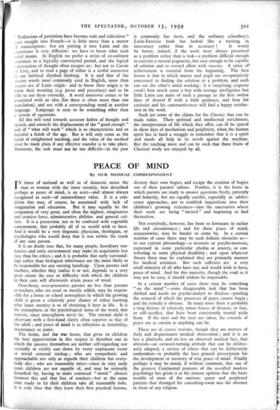PEACE OF MIND
By OUR MEDICAL CORRESPONDENT
Itimes of national as well as of domestic stress the man or woman with the inner serenity, best described perhaps as peace of mind, is an asset—and almost always recognised as such—of extraordinary value. It is a con- dition that may, of course, be associated with lack of imagination and education. But it may equally be the companion of very great, and often the highest, imaginative and creative force, administrative abilities and general cul- ture. It is a possession, not to be confused with vegetable contentment, that probably all of us would wish to have. And it would be a very dogmatic physician, theologian, or psychologist who would deny that it was within the reach of any sane person.
It is no doubt true that, for many people, hereditary ten- dencies and early environment may make its acquisition less easy than for others ; and it is probable that early surround- ings rather than biological inheritance are the more likely to be responsible for any existing handicap. Upon parents and teachers, whether they realise it or not, depends to a very great extent the ease or difficulty with which the children in their care will afterwards attain peace of mind.
Over-fussy, over-possessive parents no less than parents or teachers, who are cruel or merely selfish, may be respon- sible for a home or school atmosphere in which the growing child is given a relatively poor chance of either learning what inner serenity is or of obtaining it later in life. It is the atmosphere, in the psychological sense of the word, that matters, since atmospheres never lie. The normal child is observant with a first-hand clarity often superior to that of the adult ; and peace of mind is as infectious as irritability, inconstancy or panic.
The home, and the war home, that gives its children the best opportunities in this respect is therefore one in which the parents themselves are neither self-regarding nor excitedly or visibly cast down by every unpleasant event or trivial external mishap ; who are sympathetic and approachable not only as regards their children but every- body else ; who are reasonably strict—since in very early years children are not capable of, and may be seriously disturbed by, having to make continual " moral " choices between this and that line of conduct—but at the same time ready to let their children take all reasonable risks. It is only thus that they learn their first practical lessons, destroy their own bogies, and escape the creation of bogies out of their parents' taboos. Further, it is the home in which parents are ready to answer questions freely, patiently and honestly, but are equally careful, especially as adoles- cence approaches, not to establish inquisitions into their children's growing reticences—into the sanctuaries where their souls are being " invited " and beginning to find themselves.
Not everybody, however, has been so fortunate in earlier life and circumstance ; and for these peace of mind, aequanimitas, may be harder to come by. In a certain number of cases there may be such definite obstacles as— to use current phraseology—a neurosis or psycho-neurosis, expressed in some particular phobia or anxiety, or con- tributing to some physical disability ; and upon whatever theory these may be explained they are primarily matters for medical attention. But such sufferers are a very small minority of all who have not, and would wish to have, peace of mind. And for this majority, though the road to it may not be easy, it should seldom be impassable.
In a certain number of cases there may be something " on the mind "—some disagreeable task that has been shirked and needs no psycho-analyst to disclose—pending the removal• of which the processes of peace cannot begin ; and the remedy is obvious. In many more there is probably a long history of relatively minor fences of distaste, or fear, or self-sacrifice, that have been consistently turned aside from. If the next and the next are taken, the rewards of peace are as certain as anything can be.
These are of course truisms, though they are matters of daily and dispassionate medical observation ; and it is no less a platitude, and no less an observed medical fact, that altruism- .=an outward-turning attitude that can be deliber- ately adopted, a service of others that can be deliberately undertaken—is probably the best general prescription for the development or recovery of true peace of mind. Finally perhaps it may be noted, if without comment, that one of the greatest Continental pioneers of the so-called modern psychology has given it as his mature opinion that the basic trouble of most of the anxious, queer and perplexed patients that thronged his consulting-room was the absence in them of any religion.










































 Previous page
Previous page